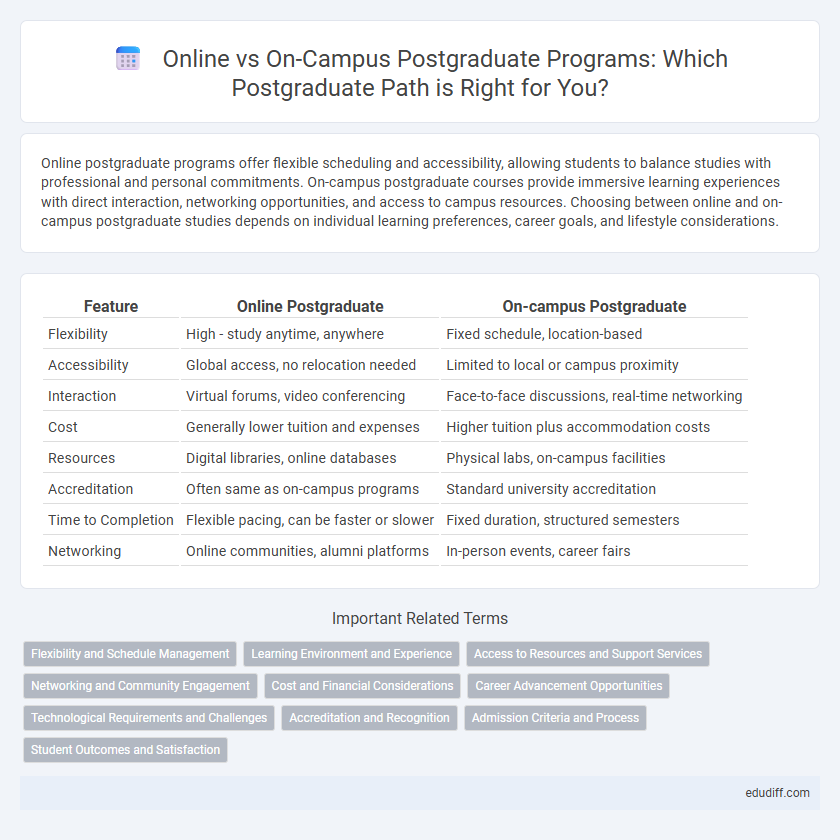Online postgraduate programs offer flexible scheduling and accessibility, allowing students to balance studies with professional and personal commitments. On-campus postgraduate courses provide immersive learning experiences with direct interaction, networking opportunities, and access to campus resources. Choosing between online and on-campus postgraduate studies depends on individual learning preferences, career goals, and lifestyle considerations.
Table of Comparison
| Feature | Online Postgraduate | On-campus Postgraduate |
|---|---|---|
| Flexibility | High - study anytime, anywhere | Fixed schedule, location-based |
| Accessibility | Global access, no relocation needed | Limited to local or campus proximity |
| Interaction | Virtual forums, video conferencing | Face-to-face discussions, real-time networking |
| Cost | Generally lower tuition and expenses | Higher tuition plus accommodation costs |
| Resources | Digital libraries, online databases | Physical labs, on-campus facilities |
| Accreditation | Often same as on-campus programs | Standard university accreditation |
| Time to Completion | Flexible pacing, can be faster or slower | Fixed duration, structured semesters |
| Networking | Online communities, alumni platforms | In-person events, career fairs |
Flexibility and Schedule Management
Online postgraduate programs offer unparalleled flexibility, enabling students to balance studies with personal and professional commitments by accessing course materials anytime and anywhere. On-campus postgraduate programs require fixed class schedules and physical presence, which may limit the ability to accommodate work or family obligations. Effective schedule management in online postgraduate studies fosters self-discipline, while on-campus programs provide structured routines and direct interaction with faculty and peers.
Learning Environment and Experience
Online postgraduate programs offer flexible learning environments tailored for self-motivated students, utilizing digital platforms that facilitate multimedia content, virtual discussions, and asynchronous collaboration. On-campus postgraduate programs provide immersive, face-to-face interactions, fostering direct engagement with peers, faculty, and resources such as labs and libraries, which enhance experiential learning. The choice impacts networking opportunities and learning dynamics, with online environments emphasizing technological adaptability and on-campus settings promoting immediate academic immersion.
Access to Resources and Support Services
Online postgraduate programs offer 24/7 access to digital libraries, virtual labs, and remote academic support, making it easier for students to study flexibly from any location. On-campus postgraduate students benefit from immediate access to physical resources such as campus libraries, study groups, and face-to-face tutoring, enhancing hands-on learning and networking opportunities. Both formats provide specialized support services, but on-campus programs tend to deliver more direct interpersonal interaction with faculty and peers, which can aid in complex research and collaborative projects.
Networking and Community Engagement
Online postgraduate programs offer flexible networking opportunities through virtual forums, webinars, and global peer interactions, allowing students to connect beyond geographical boundaries. On-campus postgraduate experiences provide face-to-face engagement, facilitating spontaneous discussions, collaborative group work, and access to campus events that foster deeper community ties. Both modes support professional networking but differ in the immediacy and personal nature of community interactions.
Cost and Financial Considerations
Online postgraduate programs typically offer lower tuition fees and eliminate expenses related to commuting, housing, and campus amenities, making them more cost-effective than on-campus options. On-campus postgraduate studies may involve higher tuition costs along with additional expenses such as accommodation, transportation, and meal plans. Financial considerations should also include eligibility for scholarships, assistantships, and employer reimbursement programs, which can vary significantly between online and on-campus formats.
Career Advancement Opportunities
Online postgraduate programs offer flexibility for working professionals to gain advanced skills without interrupting their careers, often featuring virtual networking events and global cohorts that expand professional connections. On-campus postgraduate programs provide direct access to campus resources, face-to-face mentorship, and local industry connections, which can facilitate internships and job placements in specific geographical regions. Both formats enhance career advancement opportunities through specialized coursework, but the choice depends on individual career goals, learning preferences, and networking priorities.
Technological Requirements and Challenges
Online postgraduate programs demand reliable high-speed internet, advanced learning management systems, and compatible devices to facilitate virtual lectures, digital assessments, and real-time interactions. Technological challenges include potential connectivity disruptions, software compatibility issues, and the need for digital literacy among students and faculty. On-campus postgraduate studies rely less on personal technology but still require access to campus servers, library databases, and occasional online resources, minimizing the risk of tech-related barriers.
Accreditation and Recognition
Accreditation and recognition are critical factors when comparing online postgraduate programs with on-campus counterparts, as both modes must meet rigorous academic standards set by national and international accrediting bodies. Online postgraduate degrees offered by accredited institutions ensure that the coursework, faculty qualifications, and assessment methods are equivalent to traditional on-campus programs, promoting equal professional credibility and eligibility for further academic pursuits. Employers and academic institutions increasingly recognize accredited online postgraduate qualifications, enhancing graduates' career prospects and opportunities for research collaboration.
Admission Criteria and Process
Online postgraduate programs often offer flexible admission criteria with an emphasis on professional experience and digital proficiency, streamlining the application process through online portals and virtual interviews. In contrast, on-campus postgraduate programs typically require traditional academic qualifications, standardized test scores, and in-person interviews, with a more formal and time-intensive admissions timeline. Both formats demand a rigorous evaluation of transcripts, recommendation letters, and personal statements but differ in accessibility and procedural convenience.
Student Outcomes and Satisfaction
Online postgraduate programs offer flexibility and accessibility that contribute to higher student satisfaction for those balancing work and personal commitments, while on-campus postgraduate programs often provide richer face-to-face interaction and networking opportunities, which can enhance collaborative learning and career advancement. Studies show student outcomes in terms of knowledge retention and skill application are comparable between both modes, though on-campus students may report greater engagement and immediate support from faculty. The choice between online and on-campus postgraduate education ultimately depends on individual learning preferences, career goals, and lifestyle considerations affecting satisfaction and academic success.
Online Postgraduate vs On-campus Postgraduate Infographic

 edudiff.com
edudiff.com